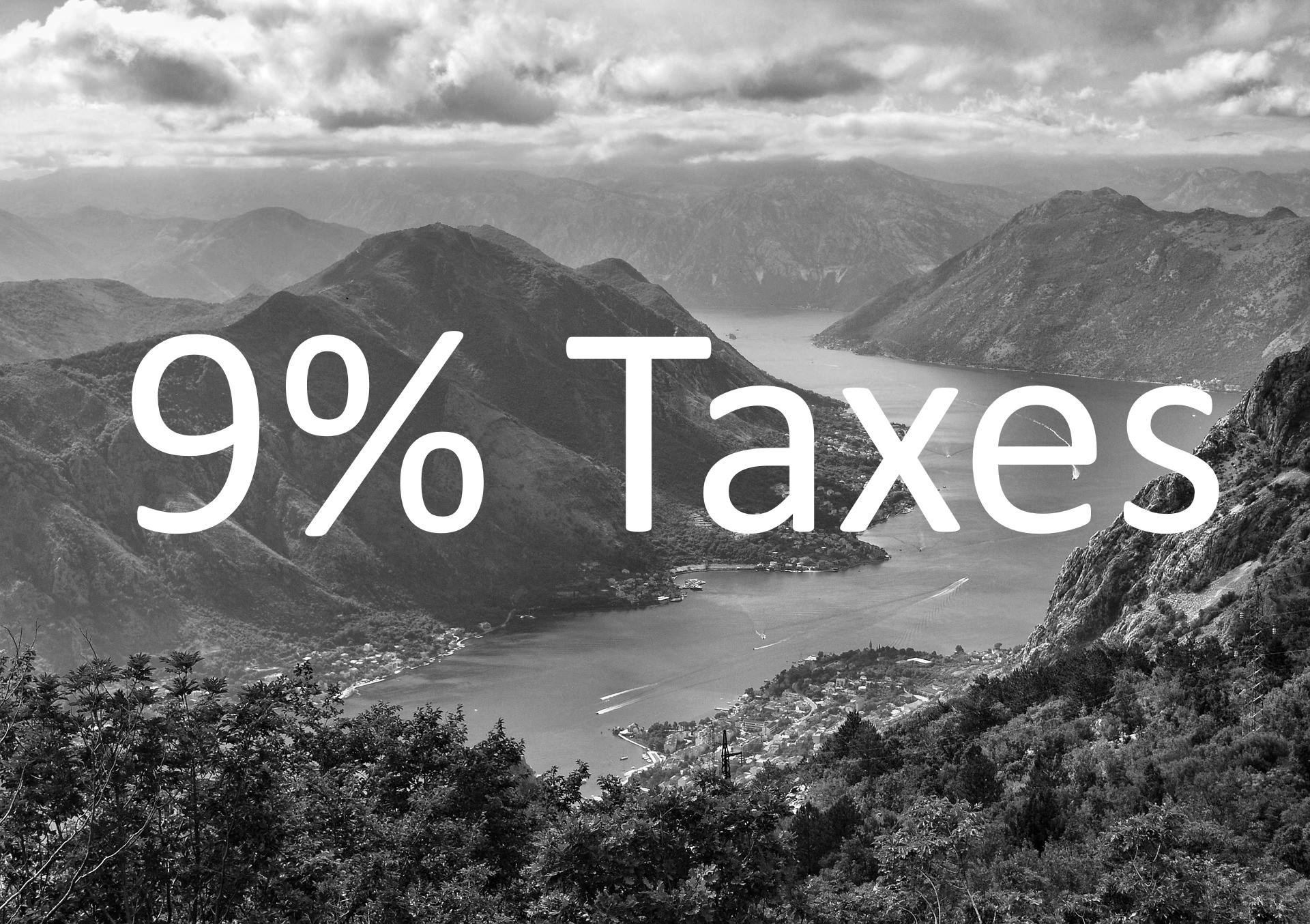Vergi Oranları
Table of Contents
ToggleCorporate Taxes in Montenegro
Resident Status of the Taxpayer
Businesses in Montenegro pay 9% on their business income in the form of a corporate profit tax (CPT). If the business is a resident company, it gets taxed on its worldwide income. If the business is incorporated or has its place of effective management in Montenegro, then the legal entity is considered a resident entity.
Non-resident entities pay taxes on Montenegro-derived income or income that is derived from so-called Permanent Establishments (PE) in Montenegro. PE is simply a fixed premise trough which a non-resident does business in Montenegro. This can either be via a branch office, factory, workshop, mine, stone pit, etc. There is no Permanent Establishment if the non-resident has inventory for the only purpose of delivering goods. Non-resident taxpayers are also liable to withholding taxes from Montenegrin sources.
Corporate Income Taxes
The IFRS (International Financial Reporting Standards) is the basis for determining and adjusting the accounted profit which is disclosed in the profit and loss statement. The tax year in Montenegro is the calendar year, and the tax return should be handed in until March 31st.
Capital Gains, Interest, Royalties, Dividend Taxes
Businesses realizing profits with financial securities or property transactions need to pay 9% Capital Gains Tax. Capital Gains can be offset against losses in the same accounting period. Capital losses can be carried forward up to 5 years.
Income derived from Interest is subject to a 9% corporate profit tax.
Royalty income is taxed at a rate of 9%.
Income derived from Dividends is subject to a 9% corporate profit tax. If the distributor of the dividend is a Montenegrin company, divdend income is free from corporate profit tax.
Foreign Sourced Income
If you receive foreign income as a Montenegrin resident taxpayer, you can be granted a tax credit for the taxes paid abroad. This amount can not be greater than the amount that would be applicable using Montenegrin tax rates. Income earned abroad cannot be deferred into the future.
Branch Income Tax
Non-resident businesses acting in Montenegro with the help of a Permanent Establishment pay 9% taxes on their Montenegro-derived income. Branches are considered a Permanent Establishment.
Corporate Deductions and Expenses
Assets – both tangible and intangible – with a useful life greater than one year and a value of greater equal 300 Euros can depreciate. There are five groups for depreciable assets in Montenegro with the following rates:
- 5%
- 15%
- 20%
- 25%
- 30%
Only the first group (Real Estate) depreciates according to the straight-line method. Another method is used for the assets in all other groups (2-5) – the declining-balance method.
Business-related interest expenses are deductible. The cost of a loan and interest paid to the creditor is only deductible to the amount of prevalent market interest rates.
Bad debt is deductible given that:
- the debt is older than one year
- a lawsuit was filed or receivables were reported in liquidation and bankruptcy proceedings
- the to-be-written off receivables were included in the revenues
- the doubtful debt was written off as uncollectible
Contributions to Charity
Companies in Montenegro can claim deductions on expenditures made to charities or legal entities that engage in the following activities:
- fight against poverty, corruption, and crime
- support social causes (care for people with disabilities, youth and elderly care)
- promote democratic ideas like the rule of law, civil society, and volunteerism
- environmental activism
- promotion of art and cultural activities
Expenses up to 3.5% of total revenue can be recognized if the receiver of the expenditures is a lawfully charitable entity.
Salary costs and costs related to the termination of employment
Only in the tax period in which they occur, salary costs, severance payments related to the retirement of workers, costs related to technological surplus are recognized as deductible.
Other deductible expenditures
- membership fees for chambers of commerce up to 0.1% of gross revenue
- entertaining expenses up to 1% of total revenue
- provisions for renewable natural resources, warranties for the sale of goods and services (guarantee period), and the expected loss from court processes if accounted for in accordance with the accounting legislation.
- provisions for deductible redundancy payments and jubilee awards up to the amount allowed for by the labor laws
- increase of provisions of balance-sheet receivables and provisions for off-balance sheet losses are recognized as expenses in the bank’s tax assessment form which were reported by the bank as an expense in the profit and loss statement in the tax period.
- increase of indirect write-offs made according to the collectability of receivables and technical provisions of the insurance company
- provisions for special risks of brokers and dealers up to the amount mentioned in the securities laws
Payments to foreign affiliates
If a Montenegrin business entity receives goods or services from a foreign group entity, the excess expenses recorded over market value are not recognized as deductible expenses and must be valued at arm’s length.
Corporate Withholding Taxes
The withholding tax rate is 9% and is levied on Montenegro-sourced income distributed to a non-resident. It applies to dividends, capital gains, interest payments, royalties, rental property income, intellectual property rights fees, market research, and consulting fees, audit service fees, income from sports or artistic events in Montenegro. Resident and non-resident taxpayers also pay a withholding tax on income from the repurchase of used products, semi-final products, and agricultural products from a VAT-registered producer.
Withholding taxes are paid on profit shares and the distribution of dividends to either a Montenegrin legal entity or individual. Montenegro signed 42 Double Taxation Treaties (DTT) so far with the following countries:
The Double Tax Treaty is meaning to either reduce or eliminate the Withholding Tax in Montenegro. In order to qualify for the preferential tax rate of the DTT, the non-resident needs to prove residency in the treaty country and beneficial ownership over the business income. This is done by showing the tax residency certificate of the treaty country. The document needs to be filled out and stamped by the relevant authority of the residency country.
Notes:
- The dividend columns in some cases contain two different numbers: if the company that receives the dividend is at least a 25% owner of the paying company, then the lower rate does apply
- The royalties column on some cases contains two different numbers: a 10% rate is levied on patents, petty patents, brands, models, and samples, technical innovations, secret formulas, technical procedures, a 5% rate is used for literary, scientific, and artistic work and films.
- For Malaysian dividends: if they are paid to Malaysian residents, they are taxable at 9% in Montenegro, if paid to Montenegrin residents 0% applies
- For Slovenian Interest: 10% is applicable for industrial property, 5% for intellectual property
- United Arab Emirates: a 5% rate is used when the beneficial owner is a company that holds at least 5% of the capital of the payer of the income; in all other cases 10% does apply.
Mandatory Social Security Contributions
The base for the calculation of the mandatory monthly social security contributions is the income of the employee and includes the gross salary and gross salary from freelance contracts. Note: This is why we recommend freelancers to better open a Limited Liability company and pay out earnings via a dividend.
Social Contributions are withheld by the employer from the gross salary and paid on a monthly basis.
| Contributions to Social Security | For Employee | For Employer |
|---|---|---|
| Health Insurance | 8.50% | 2.30% |
| Pension and Disability Insurance | 15% | 5.50% |
| Unemployment Insurance | 0.50% | 0.50% |
Corporate Incentives and Tax Credits
Newly-founded companies in Montenegro’s undeveloped municipalities
There is the possibility of an 8-year corporate income tax break for newly-established companies in the underdeveloped municipalities of Montenegro. These regions are mostly in its not so affluent North. The maximum amount a company can claim is 200.000 Euros. Note: The tax exemption is not applicable to the following sectors:
- primary production of agricultural products
- transport
- shipyards
- fishery
- steel production
- trade
- catering (except primary catering)
So, if you as a taxpayer make a choice for these underdeveloped municipalities to place your production units in, you can become exempt from income tax for the first eight years.
Subsidies for the employment of certain categories of unemployed persons
The subsidies may be used by an employer who hires:
- a worker who is at least 40 years old;
- an unemployed person from Roma, Ashkali, or Egyptian descent;
- an unemployed person who is in the records of the Employment Agency for five years or longer;
- a person who is employed by public employment measures;
- a person not able to find work after years of traineeship;
- a seasonal worker;
- an unemployed person with over 25 years of work history, who is currently a net receiver of government benefits.
If business owners choose to employ workers from one of the above-listed categories, they will not pay:
- Mandatory contributions to the state in the form of pension and disability payments, contributions to the health insurance scheme and the Labor Fund.
- Tax on personal income
NGO’s (Non-Governmental Organizations)
NGO’s are allowed to lower their tax base by 4000 Euros under the condition that the money is used for the realization of the NGO’s mission and goals.
Discount for settling the corporate profit tax liability on time
If, as a taxpayer, you settle the corporate profit tax liability by the deadline on March 31st, you will be given a 6% discount.
Foreign Tax Credit
As a resident taxpayer, you can claim a foreign tax credit up to the amount of foreign CPT paid. The credit cannot exceed the amount that would have been paid in Montenegro.
VALUE ADDED TAX (VAT)
In Montenegro, a Value Added Tax (Sales Tax) is charged to consumers based on the purchase price of certain goods and services. The Value Added Tax rate in Montenegro is 21% on goods and services, 7% on essential goods and services like medicine, books, meat, milk, bread, medicines, textbooks, newspapers, and public transport. 0% VAT is levied on the export of goods, the supply of gasoline for boats and yachts, supply of goods and services that are used in international air and maritime traffic or in the free trade zones, and certan equipment used in the construction of luxury hotels.
The tax is levied on all companies that have revenues greater than 18.000€ per year. Businesses pay VAT on a monthly basis. For imported goods, businesses pay VAT besides other import duties. VAT returns have to be filed with the tax office within 15 days.
| Value Added Tax | VAT rate |
|---|---|
| Standard Rate | 21% |
| Reduced Rate | 7% |
| Zero Rate | 0% |
| Refund Period | 60 days |
| Export Companies | 30 days |
Customs and Excise Duties
Montenegro has no export duties.
If you want to import goods into Montenegro, customs duties will be calculated on the basis of an ad valorem or specific duty per unit of good rate.
Ad valorem duties range from 0 – 30%.
Specfic duties range from 0.04 – 1.00€ per kg.
Montenegro has free-trade agreements with the European Union, EFTA (Switzerland, Norway, Iceland and Liechtenstein), CEFTA (Serbia, Albania, Bosnia, Macedonia, Moldova), Russia, Turkey and Ukraine.
Custom duties along with Value Added Tax should be paid within 8 days.
Excise Duties
Importers and producers of the following goods must pay excise duties:
-Alcoholic beverages
-Tobacco
-Mineral oils and derivatives
-Mineral water with sugar or aroma
-Liquid for e-cigarettes
Excise duty assessment should be filed with the tax authorities within 15 days after the end of the month.
Tax on coffee ranges from 0.80 – 1.30€ per kg.
Personal Income Tax Rate Montenegro
How does the Personal Income Tax Rate in Montenegro compare to other countries?
As you can see from the graph below, Montenegro levies a 9% flat tax rate on personal income (PIT) on salaries, investment income, and rental income from a property. This is the best tax rate in the whole of Europe and in the top 1% percentile worldwide. As a Montenegrin resident, you will have the advantage of paying very little income taxes. Note: For above-average incomes, the Montenegrin government has abolished the tax increae to 11%, which is good news.
For your personal income tax rate you will be taxed as an individual on your worldwide income based on your residence status. That means, if you are a resident of Montenegro, you are paying taxes on your total income from all over the world. These can be dividends, royalties, interest payments, etc.
Non-residents are subject to paying income tax on their Montenegro-sourced income under the same rules as resident taxpayers.
This is actually one of the main reasons our clients choose Montenegro as their new country of residence. It has become increasingly difficult to find a place where you can relatively easily obtain residency in and paying low taxes, and still being geographically well-positioned.
Tax Resident Status in Montenegro
You can establish individual tax residence status in Montenegro by:
- having a domicile in Montenegro
- spending at least 183 days in a year in Montenegro
- having your center of personal and economic activity in Montenegro
As you can see, if as an individual, your center of life and/or business is in Montenegro, or if you stay in Montenegro continuously, or with breaks more than 183 days a year, you are considered a tax resident.
Taxation of investment income and capital gains
In Montenegro, capital income is defined as income from:
- interest
- dividends and profit shares
- shares received by members of the board of directors under special conditions
- usage of company capital or property for personal purpose
The capital gains tax is derived from and calculated from the data in your annual tax return – at a rate of 9% flat.
Interest, dividends, and rental income
Income from interest, dividends, and rental revenue is taxable at 9%. The tax on interest and dividends is withheld by the payer of the income. Rental income deductions are available in the amount of 30-70%, depending on the nature of the rental.
Gains from stock options exercises
The 9% flat tax rate applies.
Foreign exchange gains and losses
This is not subject to taxation.
What are the exceptions with capital gains taxes?
The sale of a property is not taxed if the transfer of property is a gift to relatives of the first hereditary order or if the property is the main and only domicile of the taxpayer.
Tax Return and Compliance
The annual tax return should be filed at the latest on April 30th for each calendar year. The return can be submitted personally or via mail.
The tax year in Montenegro ends on December 31st.
SUMMARY: TAXES IN MONTENEGRO
- Resident companies and Individuals pay a flat 9% tax rate on profits and income
- Non-resident companies are taxed on their Montenegro-sourced income at a rate of 9%
- Value Added Tax is levied is levied in accordance with EU guidelines and is 21% (reduced rate 7%)
- Montenegro residents pay tax on their worldwide income, again 9%
- Corporate Profit Tax due March 31st
- Personal Income Tax due April 30th
- Withholding tax for Dividends, Royalties, and Interest is 9%
Do you need more information?
+382 69 920 173




